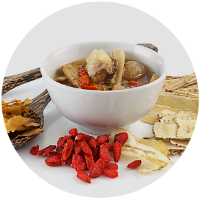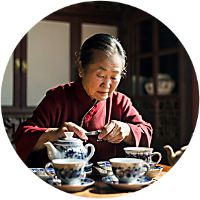Eating for Winter:
Warming the Kidneys and Storing Energy
In traditional Chinese medicine (TCM), winter is the season of water—linked to the Kidneys, Bladder, and the deeper reserves of energy that sustain us through life. Just as nature turns inward in winter, the human body is also called to slow down, rest more deeply, and conserve Qi. Diet plays a key role in this seasonal transition, helping the body stay warm, nourish its core, and prepare for the rebirth of spring.
 The kidneys in TCM are seen as the storehouse of Jing (精)—the essence that governs growth, reproduction, aging, and vitality. This essence is said to be gradually used up over time, which is why winter is considered a critical period for protecting it. The foods we eat in winter should be nourishing, warming, and stabilizing, aimed at supporting the kidneys and replenishing internal reserves.
The kidneys in TCM are seen as the storehouse of Jing (精)—the essence that governs growth, reproduction, aging, and vitality. This essence is said to be gradually used up over time, which is why winter is considered a critical period for protecting it. The foods we eat in winter should be nourishing, warming, and stabilizing, aimed at supporting the kidneys and replenishing internal reserves.
Hearty stews, slow-cooked soups, and deeply nourishing broths are ideal. Black beans, walnuts, sesame seeds, seaweed, and root vegetables are all traditionally used to strengthen kidney energy. Bone broth—rich and warming—is often recommended, especially when simmered with Chinese herbs like Dang gui (当归), Goji berries, or Huang qi (黄芪). Meats such as lamb, beef, or duck may be eaten in moderation, especially by those who feel cold easily or tend to have lower energy.
Unlike summer, when lighter meals and cooling foods are encouraged, winter is the time for Yang-tonifying foods—those that warm and stimulate the body. Ginger, garlic, cinnamon, and cloves may be used more liberally to promote circulation and drive out cold. At the same time, it's important not to overdo heat-producing foods, especially for people prone to dryness or irritability. Balance remains essential.
Cold drinks and raw foods are best minimized in winter. The digestive system, especially the Spleen and Stomach Qi, benefits from warmth and regularity. Congee made with black rice, millet, or glutinous rice—sometimes with added walnuts or red dates—offers a simple, grounding meal that supports both digestion and kidney health.
Emotionally, winter is a time of quiet and reflection. The kidneys are said to house Zhi (志), the will or inner drive. Supporting them through rest and appropriate food helps us reconnect with inner purpose and face the new year with strength. This is not the season for overexertion, fasting, or pushing the body to extremes.
Instead, TCM teaches us to follow the rhythm of nature. In winter, that rhythm is slow and deep. Eating in alignment with the season is one way to honor this inward turn—preserving energy, warming the core, and laying the foundation for health in the year ahead.
Vocabulary Guide
qi (气) – vital energy; drives all movement and transformation in the body
jing (精) – essence; stored in the kidneys and associated with longevity and vitality
yang (阳) – active, warming energy that protects and supports the body
yangsheng (养生) – “nourishing life,” the TCM practice of maintaining health through daily choices
zhi (志) – the will or inner determination, associated with the kidneys in TCM







